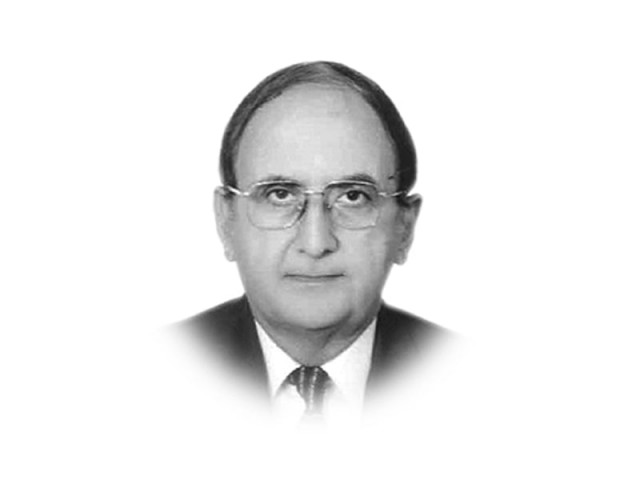Terrorism: domestic and global dimensions
Taliban was described as a "stakeholder" in Pakistani society, at All-Parties Conference on terrorism in Sept 2013

The writer is an independent political and defence analyst. He is also the author of several books, monographs and articles on Pakistan and South Asian affairs
Three major issues are key to understanding the dynamics of extremism and terrorism. The marginalisation of some and the ways in which social and political alienation develops in a section of society; internal incoherence and chaos in the face of the collapse of state authority and the erosion of the commanding role of the state; the ideology and worldview of extremist and violent groups, or their self-articulated narrative of perceived exploitation and injustices and a promise of turning the ideological utopia into a reality. Furthermore, criminality and the sheer desire to take advantage of an unstable situation in society also attracts a good number of groups and individuals to pursue their exclusive and criminal agendas, by identifying with such extremist groups or by floating their own groups.
Extremism and terrorism have become far more complex than domestic crime and violence. Therefore, it requires capacity-building by the state to track these groups and the use of strong and coercive methods to effectively deal with them. The state must demonstrate through tough actions that terrorist groups cannot get away scot-free after resorting to violence. A concerted and holistic approach is needed to cope with extremism and terrorism, which includes military and non-military or non-coercive methods. International cooperation is needed for exchanging information on extremism and terrorism, building state capacity to control criminal and terrorist activity, curtailing the movement of personnel and funding across the territorial boundaries of states. These efforts come in conflict with the current notion of globalisation that calls for greater movement of goods, services, investment and trade across state frontiers and geographical divides. The fruits of globalisation cannot be enjoyed by the states that suffer from extremist and violent activity. Therefore, extremism and terrorism become major obstacles to improving state economy and the quality of life for the common people which, in turn, contributes in the alienation of people from state institutions and processes.
The French president and his government acted swiftly and without reservations in dealing with the post-attack situation. The guiding principle was that no individual and group can challenge the authority of the state and that it is the primary responsibility of the state to protect the life and property of the people. This approach needs to be compared with the response of the civilian government in Pakistan, which pursues an ambiguous approach towards extremist and terrorist groups. The military also suffered from this dilemma in the past. However, it has come to the conclusion that such groups are a threat to state survival. However, the PML-N and its allies derive electoral support from right-wing and religious groups, which have sympathy for militancy. The exigencies of electoral politics make it difficult for Pakistan’s federal government to articulate a unity of mind and action on extremism and militancy. It was ironic that the joint statement issued after the end of the All-Parties Conference on terrorism in September 2013, described the Pakistani Taliban as a “stakeholder” in the Pakistani state and society.
Another interesting facet of terrorism in Paris is that the European and North American states adopted a unified and determined disposition for eliminating terrorism. There was no ambiguity in their view of how to cope with extremist and terrorist activity. Compare this with the responses of Muslim states to religious extremism and terrorism. Their state and dynastic rivalries and religious preferences influence their disposition towards extremist groups. For example, some conservative Arab states support hardline religious groups in their quest to dislodge the Bashar-al-Assad government in Syria. The support of and opposition to the Muslim Brotherhood movement has been a point of contention in the Middle East. Each state acts more on the basis of its dynastic and state exigencies rather than adopting a non-ambiguous and determined policy to eliminate extremist and militant groups.
There is a downside to the policies of the European and North American states in the aftermath of the terrorist attacks in Paris. Though the French government and the US president argued that terrorism was an act of a few and that it could not be linked to Islam or Muslims as a whole, who oppose such violence, at the societal level, there were numerous instances in these countries of a display of hatred against local Muslims. Even in New York City, Muslim men and women were subjected to what The New York Times described as “Islamophobic taunts” and physical assaults. The European states and the US must strictly discourage the negative attitude of their societies towards Muslims. These governments and leaders must engage with local Muslim communities in their respective countries. It is important to understand why a good number of Muslims feel marginalised in these societies and complain about non-availability of equitable opportunities for their cultural and religious expression. The more there are opportunities for them to enter the national mainstream, the more isolated becomes the small fraction of their population that subscribes to extremism and violent methods.
Published in The Express Tribune, November 30th, 2015.
Like Opinion & Editorial on Facebook, follow @ETOpEd on Twitter to receive all updates on all our daily pieces.















COMMENTS
Comments are moderated and generally will be posted if they are on-topic and not abusive.
For more information, please see our Comments FAQ